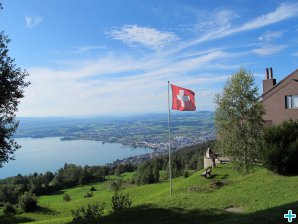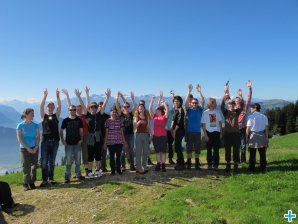NMI3-supported school: 10th PSI Summer School
13th to 22nd August 2011 - Institut Montana Zugerberg in Zug & PSI, Villigen, Switzerland
The PSI Summer School in Condensed Matter and Materials Physics was created to provide training for Ph.D. students and postdoctoral fellows working in condensed matter physics, materials science and related fields. The goal is to enable students to work at the frontiers of science and technology by providing expert training not easily available within the traditional system of graduate education and postdoctoral programs. The experimental methods provided by PSI to the scientific community, which are synchrotron light, neutrons and muons, played a crucial but not exclusive role, and the theme of this eighth school on Condensed Matter Research was chosen to be Probing phase transitions using photons, muons and neutrons.
The school was supported by NMI3 and will be for the next four years, as part of NMI3´s new ´European Neutron and Muon School´ project
Phase transitions are not only a well-known fact of everyday life, but also an important field of current research and of technological applications. Water turns to ice, ferroelectricty and magnetism coexist in multiferroics, data is stored in magnetic bits: these are all but manifestations of phase transitions.
Photons, neutrons, and muons are ideally suited for studying phase transitions because they provide information about the position of atoms, the state of electrons and the arrangement of spins.
In this edition of summer school, more than 20 world-class experts introduced the different aspects of phase transitions from an experimental and theoretical point of view.
The morning sessions always started with introductory lectures on topics such as the theory of phase transitions, or the basics of x-ray, neutron, and muon techniques. The later sessions went into details providing insight into the fields of crystallography, glasses, water, magnetism, multiferroics, the physics of aerosols, reaction oscillations and ultra-fast phase transitions.
A special session was devoted to poster presentations by the student participants. This gave the opportunity to talk with the speakers and to create new contacts.
Following the school a practical training was offered at PSI. It allowed 23 students to get hands-on experience with state-of-the-art instrumentation using photons, neutrons, and muons.
This presented a great opportunity to run neutron, photon and muon experiments. Each student selected and performed two out of seven prepared experiments. The experiments were then presented at a final round-table discussion, and discussed by the students and their supervisors.
In total, the School brought together 96 participants with 20 different nationalities and affiliations to Swiss (55), EU (38) and others (3).

For more information about the schools supported by NMI3, please visit our Education pages.


